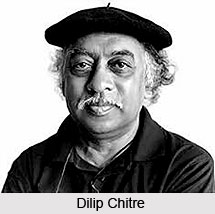 Dilip Purushottam Chitre was a prominent bilingual poet who wrote both in English and Marathi. Chitre was also a popular writer and critic who had emerged in the post-independence era in the Indian sub-continent. Chitre was not only a poet but also a painter and a filmmaker. Dilip Chitre was born in Baroda on 17th September in the year 1938. Chitre`s family had moved to Mumbai in 1951 and he had published his first collection of poems in the year 1960. Chitre was the most important influence behind the little magazine movement in Marathi.
Dilip Purushottam Chitre was a prominent bilingual poet who wrote both in English and Marathi. Chitre was also a popular writer and critic who had emerged in the post-independence era in the Indian sub-continent. Chitre was not only a poet but also a painter and a filmmaker. Dilip Chitre was born in Baroda on 17th September in the year 1938. Chitre`s family had moved to Mumbai in 1951 and he had published his first collection of poems in the year 1960. Chitre was the most important influence behind the little magazine movement in Marathi.
Some of the notable works of Dilip Chitre includes Ekun Kavita or Collected Poems published in three volumes in the nineties. His collection of English poems is known by the name, "Travelling in the Cage." Chitre was also a well- known and prolific translator and one of his famous translations was the devotional writings of Tukaram in the 17th century. Anubhavamrut by Dnyaneshwar is also a famous translation by Chitre.
Almost all the poems written by Chitre are autobiographical in nature and a variety of moods range from the lyrical and meditative to the incantatory; it reflects a continuous crisis of the inner life. Chitre in his poems had created a large intense world from his emotions especially his obsessions with sex, madness and death. In the poem, "Prayer to Shakti" Dilip Chitre has expressed a Blakean romanticism which celebrates intensely and excessively and shows openness to experience a desire to be one with the Universe. The poet had written his poems in cycles of lyrics which often have their significance rather than in any individual poem.
The reality which had been created by Chitre in his poems is that of a romantic self which converts to its own symbol, own other and author, a metaphor of nothingness and meaning. His poems express a broad range of heightened intense consciousness often in opposition and conflict.
Despite the apparent obliqueness and impenetrability of Chitre`s poems they are not surrealist in nature. Rather they are poems in which surreal effects especially of disjunctive imagery are used as a projection of consciousness. The tradition of Chitre`s is the dramatic monologue as it developed out of Browning through Pound and Eliot. Chitre had taken the method a stage further by carrying the imagery of emotion to radical extremes by further reducing the suggestion of narration to bare minimum. It can be said that Chitre`s poems were a means of holding together an otherwise fragmented reality.
It has also been noticed that Chitre`s poetry expresses an intimately subjective, inner world which ignores the physical and social world except as a stimulus of the eye and imagination.
As a professional film personality Chitre had started his career in 1969 and had made one feature film and several documentary and short films.
Chitre has been honoured in several ways for his excellent contribution in the field of literature. Some of the honours which have been bestowed on the writer include several Maharashtra State Awards, the Ministry of Human Resource Development`s Emeritua Fellowship, the University of Iowa`s International Writing Program Fellowship, the Indira Gandhi Fellowship and a lot more.













